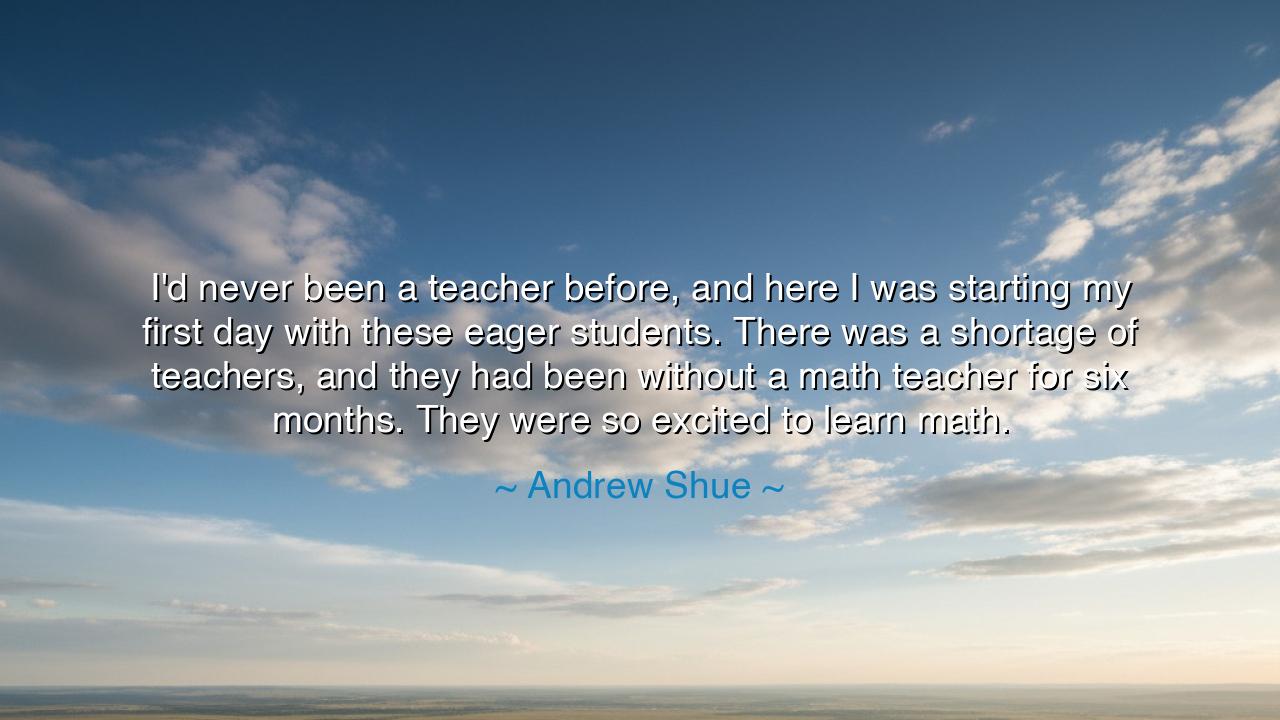
I'd never been a teacher before, and here I was starting my
I'd never been a teacher before, and here I was starting my first day with these eager students. There was a shortage of teachers, and they had been without a math teacher for six months. They were so excited to learn math.






Andrew Shue once recalled with humility and awe: “I’d never been a teacher before, and here I was starting my first day with these eager students. There was a shortage of teachers, and they had been without a math teacher for six months. They were so excited to learn math.” In these words we hear the trembling of a soul thrust into responsibility, unprepared yet willing, untrained yet present. It is the ancient story of one who steps into a gap not of his own design, yet discovers in that gap the hunger of others and the hidden strength within himself.
The meaning of this quote lies in the sacred encounter between need and service. Shue, untested as a teacher, found himself before students who had been deprived of guidance for half a year. Their excitement was not for him, but for the chance to learn, for the gift of knowledge that had been withheld by circumstance. In that moment, his lack of experience was overshadowed by their thirst. The true power of teaching does not lie in flawless skill, but in the meeting of willing hearts—one to give, the other to receive.
The origin of this story comes from a time of crisis, when schools faced shortages of teachers and students were left without instruction. Shue, though known more for his career as an actor and later as a philanthropist, stepped into the role not for glory but out of necessity. This act of service echoes through history, where countless ordinary people have risen beyond their own doubts to meet the needs of others. It reminds us that often the greatest teachers are not those who sought the title, but those who answered a call when others could not.
History itself provides shining parallels. Consider Booker T. Washington, who as a young man, barely educated himself, began teaching freed slaves under the dim light of a cabin. Though he lacked polish and training, his passion ignited hope in those who had been starved of learning. Or think of the one-room schoolhouses of the American frontier, where farmers’ daughters or young men with only a few years of formal education took up the chalk, teaching children who would otherwise have none. In each case, the absence of perfection did not diminish the power of the work.
Shue’s words also reveal the excitement of students when given what they long for. For six months, they had sat without a math teacher, their minds waiting, their questions unanswered. Their eagerness reflects a truth often forgotten: that the human spirit yearns for knowledge, and when deprived of it, feels incomplete. The sight of their joy should remind us that education is not a burden but a gift, and those who hunger for it deserve our highest respect.
The lesson for us is this: do not wait to be perfect before you step forward to help. The world’s needs will rarely align with your readiness. Yet when you answer, even in weakness, you may find that your presence, your effort, your willingness, is enough. For often, what people require most is not flawless expertise, but a heart that shows up when no one else will.
Practically, this means looking around us for the gaps that need filling. Where there is absence, dare to be present. Where there is silence, dare to speak. Where others say, “I am not ready,” dare to step forward, trusting that your courage will be met by grace. And if you are a student in life, waiting for a guide, do not lose heart; when the teacher finally arrives, bring eagerness and joy, for your hunger gives strength to those who serve.
So let Andrew Shue’s reflection be passed down: he had never been a teacher, yet he became one, and in doing so, discovered the beauty of students eager to learn. It is a reminder that in times of shortage and need, the ordinary can become extraordinary, and those who answer the call may find themselves part of a story that endures beyond their own. For the greatest lessons are born not from readiness, but from courage.






AAdministratorAdministrator
Welcome, honored guests. Please leave a comment, we will respond soon